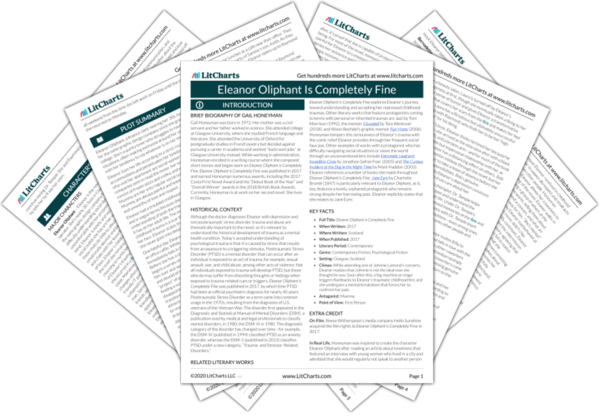To Eleanor, Polly the Plant symbolizes her dead younger sister, Marianne, who died in the house fire that Mummy started in an attempt to kill her two daughters. Caring for Polly is Eleanor’s way of proving to herself that she is capable of protecting another living thing. Eleanor’s failure to protect her sister from the fire and from Mummy’s abuse induces feelings of shame and guilt within Eleanor, who sees Marianne’s death as proof that she is cannot be trusted to love other people because she will only harm and disappoint them. Keeping Polly alive enables Eleanor to maintain some semblance of self-worth in the face of her other lingering insecurities.
But Polly also symbolizes Eleanor’s tendency to project her insecurities onto external objects as a means of denying her traumatic past. Marianne is too painful a subject for Eleanor to acknowledge on a conscious level, so Eleanor denies her existence, projecting Marianne and her own guilt onto Polly as a way of lessening her pain. As Eleanor becomes increasingly consumed by social obligations, she neglects to take care of Polly, and Polly dies. Polly’s absence leaves Eleanor without an external object onto which to project her grief and guilt, and she realizes that she is woefully ill-equipped to internalize and take ownership of her pain. Having Polly to project onto falsely convinces Eleanor that denying the past is the same as erasing it, but Polly’s absence teaches Eleanor that the opposite is true. Eleanor uses Polly not to think about Marianne, but once Polly is gone, Eleanor realizes that Marianne and the painful feelings she induces within her were there all along at the periphery of her consciousness.
Polly the Plant Quotes in Eleanor Oliphant Is Completely Fine
[Polly’s] the only constant from my childhood, the only living thing that survived. She was a birthday present, but I can’t remember who gave her to me, which is strange. I was not, after all, a girl who was overwhelmed with gifts.
Polly the plant had died that morning. I’m fully aware of how ridiculous that sounds. That plant, though, was the only living link with my childhood, the only constant between life before and after the fire, the only thing, apart from me, that had survived. I’d thought it was indestructible, assumed it would just go on and on, leaves falling off, new ones growing to replace them. I’d neglected my duties these last few weeks, too busy with hospitals and funerals and Facebook to water her regularly. Yet another living thing I’d failed to look after. I wasn’t fit to care for anyone, anything. Too numb to cry, I dropped the plant into the bin, pot, soil and all, and saw that, throughout all these years, it had been clinging on to life only by the slenderest, frailest of roots.












